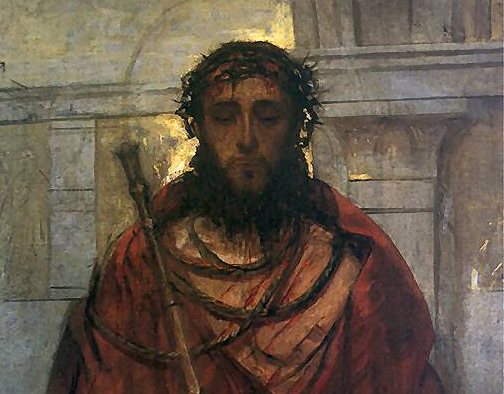[featured-image single_newwindow=”false”]Ecce Homo by St. Adam Chmielowski (1881)[/featured-image]
This is certainly easier said than done.
A reality that we live with every day is that we are human and suffer the effects of Original Sin. This makes it hard to be virtuous and we inevitably fail. Outside of Jesus Christ, the only person who never faltered in any way was the Blessed Mother. Even the saints, whom we look up to and try to imitate, sinned daily. As the book of Proverbs says,
For a just man shall fall seven times and shall rise again (Proverbs 24:16).
The hallmark of every saint is that even though they sinned on a regular basis, they were able to “rise again” and repent of their sin. Many of them would weep over their sins and see how it produced such pain in the heart of Jesus.
We all sin and the devil will try his hardest to either drive us into great despair or to make us ignorant of the weight of our sins. Both tactics ignore the great mercy of Christ and ignore the sacrifice He made on the Cross.
Come, Bitter Regret!
One Lenten tradition that St. John Paul II was taught as a child that impressed upon him the need for repentance was the Polish devotion of Gorzkie żale. This devotion that was developed in the 18th Century in Poland is a set of hymns that focus on the passion of Christ. It is sung every Sunday in Poland and is a constant reminder of the sadness of Christ’s death.
John Paul II remarked that every year on Ash Wednesday he was reminded of this Polish practice and that it “remained deeply impressed in my memory.” During a homily on Ash Wednesday he even recounted a portion of the hymn from memory. John Paul II remembered this particular stanza,
Come, bitter regret, pierce our hearts
Let go, my eyes! Well up, springs of sad tears!
The sun and stars recede, shrouding themselves in mourning.
The angels cry sadly. Who can describe their grief?
The cliff’s harden; the dead arise from the earth.
I ask what is it, what has happened? All creation is stunned!
In the presence of the passion of Christ,
We are filled with inexpressible regret!
Jesus, shatter without delay the hardness of our hearts!
Quench the ardor of my passions as I enter the depths of your passion. (John Paul II the Story of My Life: Collected Memories, 14, emphasis added)
Here is a great rendition of it in the original Polish:
John Paul II highlighted this devotion because he felt it put us right in the midst of the tragedy of the cross and that we could see Christ’s agony. It proved to be a great source of reflection for John Paul II as “the human soul is presented in front of the passion of Christ, realizing that it is a great “divine abyss” that penetrates into the abyss of our hearts” (Homily on Ash Wednesday, March 1, 1995).
By reflecting on the passion of Christ during Lent we are reminded both of the great love that Jesus has for us, but also that the reason Christ died upon the cross was on account of our sins. It reminds us that we are in need of repentance and that our sins have already hurt someone whom we should “love above all things.”
Being “in front of the passion of Christ” brings our sins to the forefront and causes us to call out to Jesus “shatter without delay the hardness of our hearts!”
This Lent, let us remember that the greatest gift we can give Jesus is our love. What better way to express that love than to place ourselves at the foot of the Cross and repent of our sins!
Challenge: Choose one sin in to “give up” during Lent and frequently avail ourselves to the sacrament of Confession each time we fail. We all know there is one particular sin that keeps on popping up every time we go to Confession. Focus on that and bring it to the suffering Christ who died for our sins and He will welcome us home with loving arms.

